人教版七年级下册-unit 12单元考点归纳
人教版七年级下册英语期末复习:Unit 7-Unit 12 各单元语法知识点复习提纲(全面!)
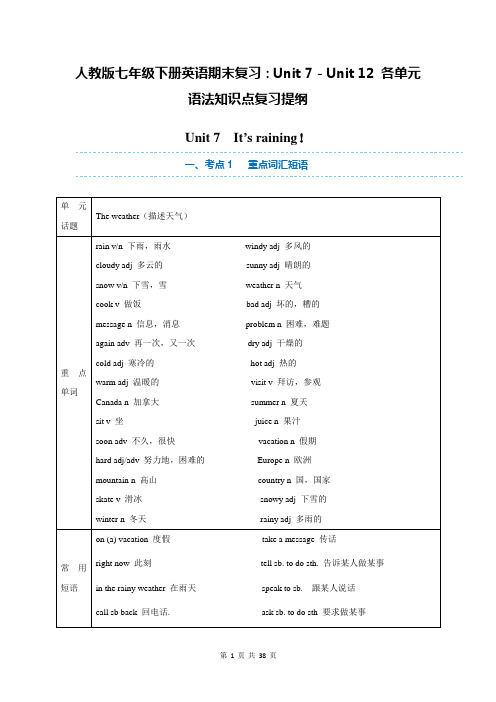
人教版七年级下册英语期末复习:Unit 7-Unit 12 各单元语法知识点复习提纲Unit 7 It’s raining!一、考点1 重点词汇短语1 messagemessage为可数名词,意为“消息,信息”,take a message for sb.“为某人捎个口信”。
拓展:give sb. a message 捎信给某人,leave a message 留口信,get the message 明白对方的意思。
Can I take a message for him?当某人发现要找的人不在或接电话的人发现打电话者要找的人不在时,常用此语2 could 情态动词意为“能,可以“,表示请求许可,在语气上比can委婉客气,但这种句式的肯定回答用can。
Could you just tell him to call me back?3 call及物动词,意为“打电话给”。
call sb. (up) “打电话给某人”,call sb. at +电话号码,意为“拨打……找某人”。
拓展:call 是一个多义词,call sb 可表示“叫醒某人,呼唤某人”;give sb. a call 给某人打电话。
4 back副词“回来,回原处,向后”;call sb. back给某人回个电话。
【即学即练】I’ll _____you _____.我将给你回电话。
5 visit此处用作及物动词,意为“拜访,探望”,后接表示人的名词或代词。
visit还可意为“参观,游览”,后接表示地点的名词。
拓展:visit还可用作可数名词,意为“访问,参观,拜访。
be on a visit to ... “正在访问/参观……”。
visitor参观者,游览者,游客。
I’m having a great time visiting my aunt in Canada._____ my grandparents every year at Christmas.我每年圣诞节都去探望我的祖父母。
人教版七年级英语下册单元知识归纳Unit12.doc
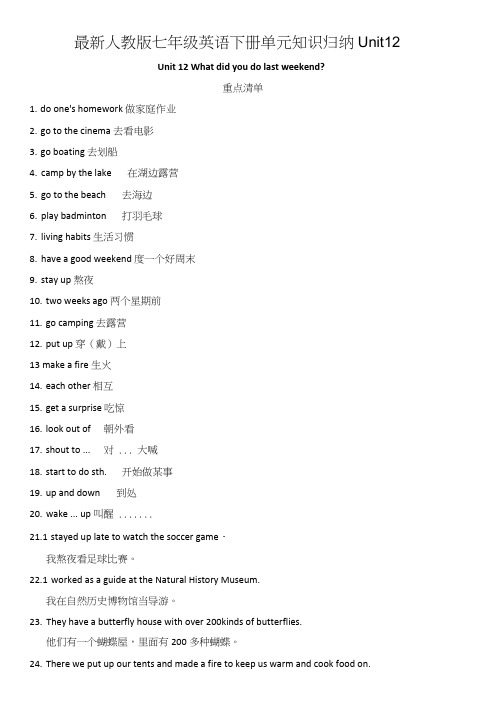
最新人教版七年级英语下册单元知识归纳Unit12Unit 12 What did you do last weekend?重点清单1.do one's homework 做家庭作业2.go to the cinema 去看电影3.go boating 去划船4.camp by the lake 在湖边露营5.go to the beach 去海边6.play badminton 打羽毛球7.living habits 生活习惯8.have a good weekend 度一个好周末9.stay up 熬夜10.two weeks ago 两个星期前11.go camping 去露营12.put up 穿(戴)上13 make a fire 生火14.each other 相互15.get a surprise 吃惊16.look out of 朝外看17.shout to ... 对 ... 大喊18.start to do sth. 开始做某事19.up and down 到处20.wake ... up 叫醒 .......21.1stayed up late to watch the soccer game・我熬夜看足球比赛。
22.1worked as a guide at the Natural History Museum.我在自然历史博物馆当导游。
23.They have a butterfly house with over 200kinds of butterflies.他们有一个蝴蝶屋,里面有200多种蝴蝶。
24.There we put up our tents and made a fire to keep us warm and cook food on.在那我们支起一个帐篷,并生火取暖,在火上烹饪食物。
25.1was so tired that I went to sleep early.我太累了,因此很早就去睡觉了。
人教版七年级英语下册-Unit 12:知识点复习总结+单元测试(word版,无答案)

Unit12 What did you do last weekend?【重点单词】camp v.扎营;扎帐篷lake n.湖,湖泊beach n.海滩,沙滩badminton n.羽毛球运动sheep n.羊,绵羊as adv.&pron.作为,当做natural pron.自然的butterfly n.蝴蝶visitor n.游客;访问者tired adj.疲倦的stay v.停留stay up late深夜不留away adv.离开run away 跑开mouse n.老鼠baby n.幼小的shout v.呼叫,喊叫shout at…冲……大声叫嚷woof v.(狗叫声)汪汪language n.语言fiy v.飞kite n.风筝fiy a kite 放风筝high adj.&adv高的(地)high school中学ago adv.以前India n.印度tent n.帐篷put up 搭起,举起moon n.月亮surprise n.&v.惊奇,惊讶get a surpris 吃惊snake n.蛇scared adj.惊慌的move v.移动shout to… 对……大声喊叫start v.开始,着手jump v.跳跃up and down 上上下下wake v.弄醒,醒into prep.到……里面forest n.森林ear n.耳朵【重点短语】1. last weekend 上周末2. do one’s homework 做作业3. go to the cinema 看电影4. go boating 去划船5. camp by the lake 在湖边露营6. go to the beach 去海滩7. play badminton 打羽毛球8. on Saturday morning 在周六的早上9. study for the English test 为了英语考试学习10. feed some cows 喂一些奶牛11. work as a guide 做为一个导游工作12. Natural History Museum 自然历史博物馆13. butterfly house 蝴蝶馆14. over 200 kinds of butterflies 超过200多种蝴蝶15. tell sb about … 告诉某人关于…16. living habits 生活习惯17. be kind of tired 有点儿累19. stay up 熬夜20. play with sb. 和某人玩21. lose things 丢东西22. run away 跑开23. fly a kite 放风筝24.as a special gift 作为一个特殊的礼物25. take sb. to sp. 把某人带到某地26. go camping 去露营27. put up the tents 搭建帐篷28. make a fire 生火29. keep sb. warm 使某人保持温暖30. on the first night 在第一天晚上31.so...that... 如此…以至于…32. go to sleep 去睡觉33. get a surprise 吃惊34. see sb. doing sth. 看见某人正在做某事35. jump up and down 上蹦下跳36. climb onto one’s back 爬到某人背上37. shout at/shout to 大声喊叫38 wake …up 把...弄醒39. move into… 移入,爬进…中40. a useful lesson 有用的一课【重点句型】1.—What did you do last weekend?Lucy?Lucy,你上周末做了什么?—Well, on Saturday, I played badminton.噢.周六我打羽毛球了。
人教版七年级下册-unit 12单元考点归纳

期末复习参考--人教版七年级下册unit 12重点内容归纳【考点归纳】1、another pron.又一个;再一个意指三者及以上当中的“另外一个”Mozart was another very important composer.xx是另一位非常重要的作曲家。
This sweater is too big for me. Could you show me another one?这件毛衣对我来说太大了。
你能再给我拿一件吗?May I have another two bananas?我可以再吃两个香蕉吗?【探究总结】another的用法(1)another用作形容词,意为“又一个的;再一个的”,指三者或三者以上中的另一个,其后接可数名词单数。
与其相对应的是“the other”,指两者当中的另外一个例如:I want to have another apple,although I have eaten one.One side of the road is so clean,but the other dirty.(2)another用作代词,意为“又一个;再一个”,一般单独使用。
(3)another作“又;再”讲时,构成短语:another+数词+可数名词复数=数词+ more +可数名词复数。
2、both pron.两个;两者Well, I like both.嗯,两种我都喜欢。
There are many flowers on both sides of the street.街道的两旁有许多花。
Both his father and his uncle are very tall.他父亲和他叔叔都很高。
【探究总结】both的用法(1)both用作代词,意为“两个;两者”;用作形容词,意为“两者都”,其后接可数名词复数形式;both用于be动词或助动词之后,实义动词之前;其反义词为neither。
人教版七年级下册-Unit-12--教材详解和知识点归纳
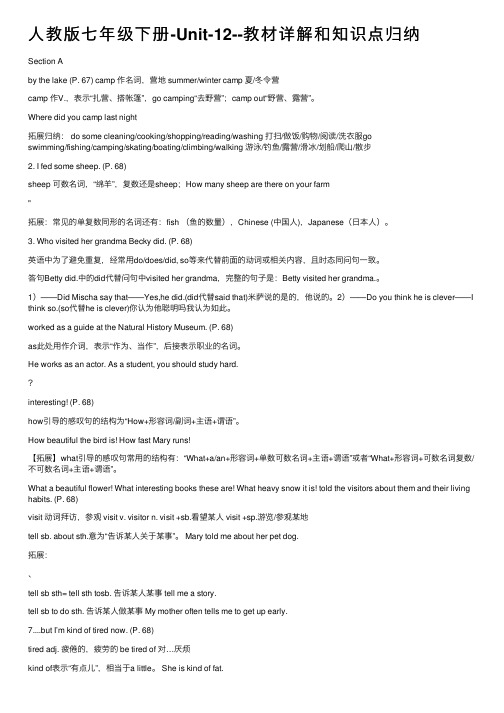
⼈教版七年级下册-Unit-12--教材详解和知识点归纳Section Aby the lake (P. 67) camp 作名词,营地 summer/winter camp 夏/冬令营camp 作V.,表⽰“扎营、搭帐篷”,go camping“去野营”;camp out“野营、露营”。
Where did you camp last night拓展归纳: do some cleaning/cooking/shopping/reading/washing 打扫/做饭/购物/阅读/洗⾐服goswimming/fishing/camping/skating/boating/climbing/walking 游泳/钓鱼/露营/滑冰/划船/爬⼭/散步2. I fed some sheep. (P. 68)sheep 可数名词,“绵⽺”,复数还是sheep;How many sheep are there on your farm"拓展:常见的单复数同形的名词还有:fish (鱼的数量),Chinese (中国⼈),Japanese(⽇本⼈)。
3. Who visited her grandma Becky did. (P. 68)英语中为了避免重复,经常⽤do/does/did, so等来代替前⾯的动词或相关内容,且时态同问句⼀致。
答句Betty did.中的did代替问句中visited her grandma,完整的句⼦是:Betty visited her grandma.。
1)——Did Mischa say that——Yes,he did.(did代替said that)⽶萨说的是的,他说的。
2)——Do you think he is clever——I think so.(so代替he is clever)你认为他聪明吗我认为如此。
worked as a guide at the Natural History Museum. (P. 68)as此处⽤作介词,表⽰“作为、当作”,后接表⽰职业的名词。
人教版英语七年级下册英语第12单元知识点归纳
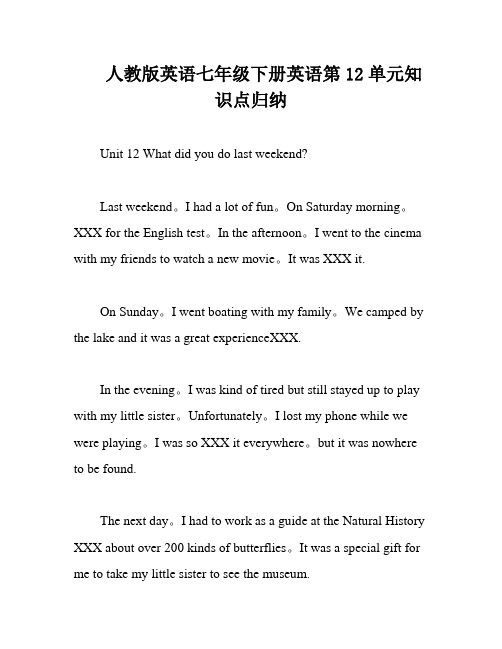
人教版英语七年级下册英语第12单元知识点归纳Unit 12 What did you do last weekend?Last weekend。
I had a lot of fun。
On Saturday morning。
XXX for the English test。
In the afternoon。
I went to the cinema with my friends to watch a new movie。
It was XXX it.On Sunday。
I went boating with my family。
We camped by the lake and it was a great experienceXXX.In the evening。
I was kind of tired but still stayed up to play with my little sister。
Unfortunately。
I lost my phone while we were playing。
I was so XXX it everywhere。
but it was nowhere to be found.The next day。
I had to work as a guide at the Natural History XXX about over 200 kinds of butterflies。
It was a special gift for me to take my little sister to see the museum.After work。
my family and I decided to go camping。
We put up the tents。
made a fire and kept each other warm。
On the first night。
(完整版)新人教版英语七年级下册1-12单元知识点归纳

Unit 1 Can you play the guitar?语言点梳理一、语法:情态动词:有一定意义,表示说话人的语气或情态,但不能单独作谓语,只能和其他动词原形一起构成谓语,没有人称和数的变化。
否定形式是在情态动词后面加上not。
变一般疑问句要把情态动词提到句子的开头,即:情态动词+主语+动词原形+其他?1.肯定句:He/She/I/We/They/You/Tom+情态动词can+动词原形.2.否定句:He/She/I/We/They/You/Tom+情态动词can+not+动词原形3.一般疑问句:情态动词can+ He/She/I/We/They/You/Tom+动词原形?Yes,主语+can./No,主语+ can’t.1)表示能力,“会;能”。
eg: Can you dance? 你会跳舞吗?2)表示请求或许可,“可以”。
eg: Can I ask you a question? 我可以问你一个问题吗?1. play the guitar/piano/violin/drums弹吉他/钢琴/小提琴/敲鼓play chess下象棋play sports 做运动play soccer/basketball踢足球、打篮球(乐器名称前加the,球类名称前不加the)2. join the art club加入艺术俱乐部/swimming club游泳俱乐部sports club运动俱乐部/story telling club讲故事俱乐部English club/ art club/ music clubjoin v.参加,加入指加入某个团体,组织,群体,并成为其中的一员。
What club do you want to join ?你想加入什么俱乐部?I want to join the swimming club.=I want to be in the swimming club.takeEg. take part in the meeting参加会议3. want sth.想要某物want to do sth.想做某事want sb to do sth 想要某人做某事4. be good at(doing...)擅长于=do well in 在某方面做得好be good with与…相处的好be good for对…有益5. like to do sth.喜欢做某事like doing sth.6. Let’s do sth.让我干…let/make sb.do sth.使某人做某事10. write stories写故事write to sb= write a letter to sb= write sb a letter11.tell /speak/say/talk的用法1) tell讲述一件事实或故事等及物动词tell sb. sth 给某人讲某事=tell sth to sb 把某事告诉某人tell sb. to do sth 告诉某人做某事tell stories讲故事=tell a story tell a lie撒谎2)speak v. 主要是讲说话的能力,往往接语言speak English讲英语3)talk 为不及物动词往往加介词再接宾语talk to sb.和…交谈/talk with sb.和…交谈(指双方)4)say往往接说话的内容eg.Our teacher says we should study hard.say it in English用英语说它12. make friends with sb.和…交朋友13. play games with sb.和…做游戏14. help sb. with sth.= help sb. (to) do sth.帮助某人做某事15. call sb. at +电话号码给某人打电话拨+号码16. on /at the weekend 在周末on weekends after school放学后17.do Chinese kung fu 打中国功夫18.be free 空闲的19. sing very well 唱得好That sounds good. 那听起来很好20.English-speaking students 讲英语的学生学生运动中心23.also /too/eitheralso/too用在肯定句,also 用于句中,too 用于句尾,either用于否定句句未eg. I am a student . He is a student,too. I am a student . He is also a student.I am not a student . He is not a student, either.24.and/or 连接两个并列成分eg.I can sing and dance.(and用于肯定句)I can’t sing or dance.(or用于否定句)Can you sing or dance ?(or用于选择疑问句“或者”)25.at27. need to do sth需要干某事need sb. to do sth 需要某人干某事28.wanted students for School show学校表演招聘学生v.展示;给….看… show sb. Sth= show Sth to sb.给某人展示n.节目;表演TV show电视节目29.teach v.教,讲授teacher n.教师teach sb.English教某人英语teach sb. sth .= teach sth to sb.教给某人某事=教某事给某人teach sb.to do sth教给某人做某事30.music n.音乐musician n. 音乐家31.piano (pl.) pianosUnit 2 What time do you go to school?知识点梳理1.What time do you get up?What time +助动词do/does +主语+动词原形,询问某人做某事的具体时间。
最全面人教版七年级下册英语第十二单元知识点归纳总结
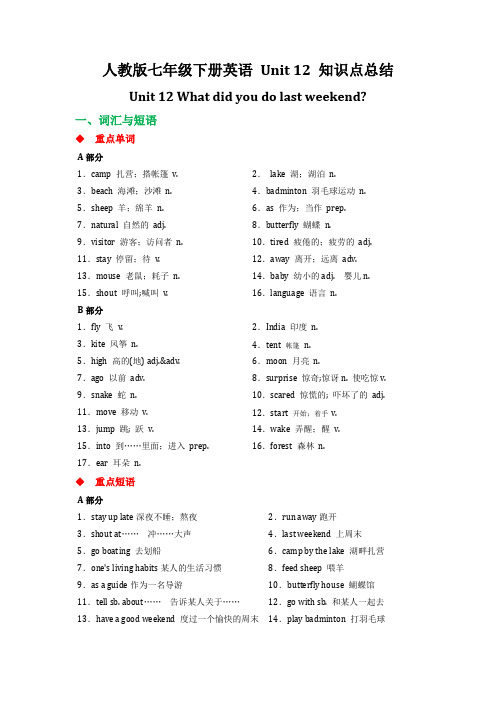
人教版七年级下册英语Unit 12 知识点总结Unit 12 What did you do last weekend? 一、词汇与短语◆重点单词A部分1.camp 扎营;搭帐篷v.2.lake 湖;湖泊n.3.beach 海滩;沙滩n.4.badminton 羽毛球运动n. 5.sheep 羊;绵羊n.6.as 作为;当作prep. 7.natural 自然的adj.8.butterfly 蝴蝶n.9.visitor 游客;访问者n.10.tired 疲倦的;疲劳的adj. 11.stay 停留;待v.12.away 离开;远离adv. 13.mouse 老鼠;耗子n.14.baby 幼小的adj. 婴儿n. 15.shout 呼叫;喊叫v.16.language 语言n.B部分1.fly 飞v.2.India 印度n.3.kite 风筝n.4.tent 帐篷n.5.high 高的(地) adj.&adv.6.moon 月亮n.7.ago 以前adv.8.surprise 惊奇;惊讶n. 使吃惊v. 9.snake 蛇n.10.scared 惊慌的; 吓坏了的adj. 11.move 移动v.12.start 开始;着手v.13.jump 跳; 跃v.14.wake 弄醒;醒v.15.into 到……里面;进入prep.16.forest 森林n.17.ear 耳朵n.◆重点短语A部分1.stay up late深夜不睡;熬夜2.run away跑开3.shout at……冲……大声4.last weekend 上周末5.go boating 去划船6.camp by the lake 湖畔扎营7.one's living habits某人的生活习惯8.feed sheep 喂羊9.as a guide作为一名导游10.butterfly house 蝴蝶馆11.tell sb. about……告诉某人关于……12.go with sb. 和某人一起去13.have a good weekend 度过一个愉快的周末14.play badminton 打羽毛球B部分1.fly a kite 放风筝2.high school 中学3.put up 搭起;举起4.each other 互相;彼此5.get a surprise 吃惊6.shout to……对……大声喊叫7.up and down 上上下下;起伏8.wake……up 把……弄醒9.a special gift 一件特殊的礼物10.take a long bus ride to 乘长途车去11.put up 搭起;举起12.keep sb. warm 使某人暖和13.on the first night 在第一个夜晚14.tell a story 讲故事15.go to sleep 入睡,睡着16.look out of 朝外看17.read a book about…读关于…的书18.know about 知道关于19.start to do sth. 开始做某事20.jump up and down 跳上跳下21.move into 搬进22.make a fire 生火23.something interesting 有趣的事情24.feel……doing sth. 觉得……正在做某事25.finish high school 高中毕业26.see……doing sth. 看见……正在做某事27.clean one's room 打扫房间28.so……that……如此……以至于……29.on Saturday night 在周六晚上30.have dinner with sb.和某人一起吃晚饭31.stay at home 待在家里32.have a busy weekend度过一个繁忙的周末33.talk show 脱口秀34.study for……为……学习◆重点句子A部分1.—What did you do last weekend? 上个周末你做什么了?—I did my homework. 我做我的家庭作业了。
人教版七年级下册英语Unit12单元语法知识点总结

人教版七年级下册英语Unit12单元语法知识点总结本单元重点短语的具体用法1. Last weekend:用于描述过去的时间,通常在句子中作时间状语。
例如:I went shopping last weekend.(我上周末去购物了。
)2. Do one's homework:表示做作业。
例如:I need to do my homework before going out.(我需要在出去之前做作业。
)3. Go to the cinema:去看电影。
例如:They decided to go to the cinema instead of staying at home.(他们决定去电影院而不是待在家里。
)4. Go boating:去划船。
例如:We went boating on the lake and had a great time.(我们在湖上划船,玩得很开心。
)5. Camp by the lake:在湖边露营。
例如:They camped by the lake and enjoyed the beautiful scenery.(他们在湖边露营,欣赏美丽的风景。
)6. Go to the beach:去海滩。
例如:I like to go to the beach to relax.(我喜欢去海滩放松。
)7. Play badminton:打羽毛球。
例如:They played badminton in the park.(他们在公园里打羽毛球。
)8. On Saturday morning:在周六的早上。
例如:On Saturday morning, I usually sleep in.(在周六的早上,我通常会睡懒觉。
)9. Study for the English test:为英语考试学习。
例如:I have to study for the English test tomorrow.(我必须为明天的英语考试学习。
Unit12单元知识点归纳总结人教版七年级英语下册

Unit 12 知识归纳重点短语go boating 去划船go to the beach 去海滩go camping 去野营shout at ... (尤指生气时)冲……大声叫嚷shout to ... (提高音量)对……大声喊stay up late 深夜不睡;熬夜put up tents 搭起帐篷fly a kite 放风筝make a fire 生火get a surprise 吃惊the next morning 第二天早上take a long bus ride 乘长途公共汽车look out of ... 向……外看learn a second language 学习第二语言learn a useful lesson 学到有用的一课camp by the lake 在湖边露营play badminton 打羽毛球work as a guide 担任导游工作run away 跑开jump up and down 上下来回地跳;跳来跳去wake ... up 把……弄醒move into ... 移进 / 搬进……living habits 生活习惯so +adj./adv. +that 句子如此……以至于……start to so sth.= start doing sth. 开始做某事be scared of ... 害怕...... be scared to do sth. 害怕做某事语法知识感叹句感叹句:表示赞美、惊叹、喜悦等感情的句子,句末用感叹号。
由“what”和“how”引导(1)what引导的感叹句①What + a / an +adj.+单数可数名词(+主语+谓语)!What a useful book (it is)!②What +adj.+复数可数名词(+主语+谓语)!What beautiful mountains (they are)!What +adj.+不可数名词(+主语+谓语)!(注意此结构与how感叹句的转换)What great weather (it is)(2)how引导的感叹句①How +adj.+ a / an +单数可数名词(+主语+谓语)!How useful a book (it is)!②How+adj./adv.(+主语+谓语)!How great (the weather is)!How well (he sings)!③How+主语+谓语!(How+句子)(了解即可)How time flies! 时光飞逝!How I miss you! 我多想念你呀!。
人教版七年级英语下册7---12单元知识点汇总

Unit 7 It ’s raining! 下雨了!◆短语归纳1. not bad 不错2. at the park 在公园3. at the zoo 在动物园 3. take a message for sb. 为……捎个口信4. have a good time / have a great time / have fun 过得愉快,玩得高兴5. call sb. back 给某人回电话6. no problem 没问题(表示乐于帮助别人)7. right now 现在= now8. talk on the phone 通过电话交谈9. some of my old friends 我的一些老朋友 10. by the pool 在游泳池边 11. drink orange juice 喝橙汁12. study hard 努力学习 13. be on a vacation 在度假 14. in the mountains 在山里 15. call sb. at+电话号码,给某人打电话16. write to sb. 给某人写信 17. take a photo of sb. 给……拍一张照片◆用法集萃◆典句必背1. How ’s the weather? = What ’s the weather like ? 天气怎么样?2. It’s cloudy . / It ’s sunny . / It ’s raining. 天气多云。
/ 天气晴朗。
/ 天正下雨。
3. How ’s it going ( with you)? (你)情况怎么样?4. Great! / Not bad. / T errible! Just so-so. 好极了!/ 不错。
/ 糟糕!马马虎虎!5. Can I take a message for him? 我能给他捎个口信吗?6. I ’m having a great time visiting my aunt in Canada. 我正在加拿大愉快地拜访我的姨妈。
人教版英语七年级下册Unit12 单元知识汇总
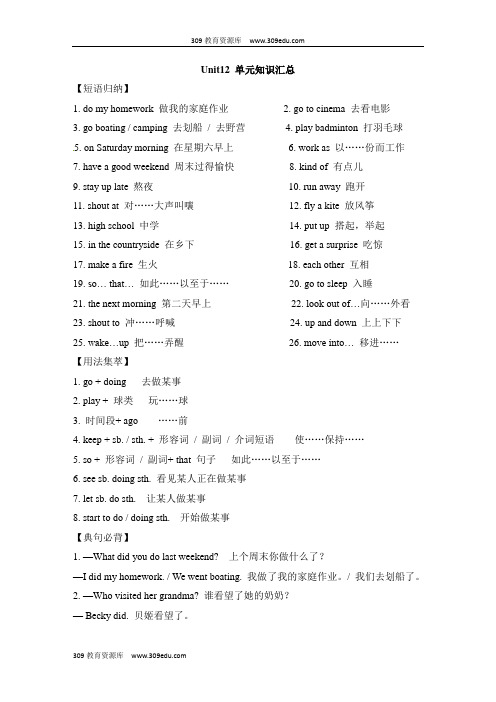
Unit12 单元知识汇总【短语归纳】1. do my homework 做我的家庭作业2. go to cinema 去看电影3. go boating / camping 去划船/ 去野营4. play badminton 打羽毛球5. on Saturday morning 在星期六早上6. work as 以……份而工作7. have a good weekend 周末过得愉快8. kind of 有点儿9. stay up late 熬夜10. run away 跑开11. shout at 对……大声叫嚷12. fly a kite 放风筝13. high school 中学14. put up 搭起,举起15. in the countryside 在乡下16. get a surprise 吃惊17. make a fire 生火18. each other 互相19. so… that… 如此……以至于……20. go to sleep 入睡21. the next morning 第二天早上22. look out of…向……外看23. shout to 冲……呼喊24. up and down 上上下下25. wake…up 把……弄醒26. move into… 移进……【用法集萃】1. go + doing 去做某事2. play + 球类玩……球3. 时间段+ ago ……前4. keep + sb. / sth. + 形容词/ 副词/ 介词短语使……保持……5. so + 形容词/ 副词+ that 句子如此……以至于……6. see sb. doing sth. 看见某人正在做某事7. let sb. do sth. 让某人做某事8. start to do / doing sth. 开始做某事【典句必背】1. —What did you do last weekend? 上个周末你做什么了?—I did my homework. / We went boating. 我做了我的家庭作业。
人教版七年级下册英语Unit12What-did-you-do-last-weekend?知识点总结

七下Unit 12 What did you do last weekend?一、Important Phrases:1.go to the cinema 去影院★=go to the movies2.go boating/camping 去划船/野营★summer camp 夏令营3.camp by the lake 在湖边野营★by the pool在池边4.go to the beach 去海滩★on the beach 在沙滩上5.play badminton 打羽毛球play+球类/棋类名词(不加冠词)6. study for the test 备考★test=exam7.feed some sheep/cows喂羊/牛★feed(fed)on...以..为食,feed with...用...喂养8. work as a guide 做导游工作★work as +职业从事某工作9. at the Natural History Museum 自然历史博物馆★nature(n.不可数)大自然-natural(adj.)自然的10. over 200 kinds of butterflies 200多种蝴蝶★over=more than 超过11.living habits 生活习惯★make a living 谋生;eating habits饮食习惯12.kind of tired 有点累★kind of = a little13. stay up late 熬夜★stay at home 待在家,stay away from 远离,lately(adv.)最近地14.sleep early 早睡★sleepy 困的,asleep睡着的15.a family of mice 老鼠一家★mouse(单)-mice(复)16.be afraid of sth./to do 害怕★afraid=scared17.run away 跑开★take away 带走,put...away 把某物收拾好,give away 捐赠18. climb onto one’s back 爬上某人的背19. shout at/to sb.冲某人大叫★shout out 大喊出20. a second language 第二语言★mother tongue 母语21.fly a kite放风筝22.do something interesting 做有趣的事★修饰不定代词,adj.后置:anything special23.finish high school 中学毕业★finish doing sth 完成做某事24.a special gift一特殊礼物★gift=present25.take us to India 带我们去印度26.take a long bus ride 坐很久的公交车27.put up our tents 搭帐篷★put up:搭建,举起,张贴28.make a fire生火29.cook food on the fire 在火上做饭★on an open fire 明火,篝火30.tell cach other stories 互相讲故事★tell a lie 说谎,tell a joke 讲笑话31.keep sb.warm 使某人保持暖和32.sit under the moon 坐在月光下★moonlight月光,moon cake月饼33.so.......that.......如此...以致于...34.get a surprise 吃惊35. look out of...向外看★look out 小心,look for寻找,look after 照顾36. jump up and down 跳上跳下37. move into the forest 进入森林38. wake sb up叫醒某人★wake up醒来,awake醒着的39. read a book about history 读一本历史书★read...to sb给某人读...40.see an interesting talk show 看有趣的脱口秀二、Key Language Points:1.Where did you go last weekend? What did you do last weekend?上周末你去了哪里?上周末你做了什么?一般过去时的特殊疑问句:1)特殊疑问词+did+主语+v.(原)+其他?如疑问词作主语,则陈述语序,如:Who bought you this new dress?谁给你买的新裙子?2)特殊疑问词+was/were+主语+其他?Where were you last night?昨晚你在哪里?2.----Who visited her grandma? -----Becky did.为避免重复,常用do,does,did,so等代替前文提到的内容。
Unit12知识归纳人教版七年级英语下册
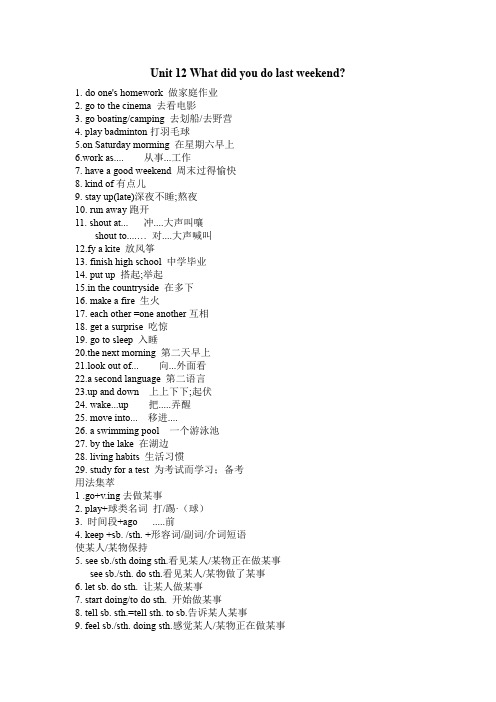
Unit 12 What did you do last weekend?1.do one's homework 做家庭作业2. go to the cinema 去看电影3. go boating/camping 去划船/去野营4. play badminton打羽毛球5.on Saturday morming 在星期六早上6.work as.... 从事...工作7. have a good weekend 周末过得愉快8. kind of有点儿9. stay up(late)深夜不睡;熬夜10. run away跑开11. shout at... 冲....大声叫嚷shout to....… 对....大声喊叫12.fy a kite 放风筝13. finish high school 中学毕业14. put up 搭起;举起15.in the countryside 在多下16. make a fire 生火17. each other =one another互相18. get a surprise 吃惊19. go to sleep 入睡20.the next morning 第二天早上21.look out of... 向...外面看22.a second language 第二语言23.up and down 上上下下;起伏24. wake...up 把.....弄醒25. move into... 移进....26. a swimming pool 一个游泳池27. by the lake 在湖边28. living habits 生活习惯29. study for a test 为考试而学习;备考用法集萃1 .go+v.ing去做某事2. play+球类名词打/踢·(球)3. 时间段+ago .....前4. keep +sb. /sth. +形容词/副词/介词短语使某人/某物保持5.see sb./sth doing sth.看见某人/某物正在做某事see sb./sth. do sth.看见某人/某物做了某事6. let sb. do sth. 让某人做某事7. start doing/to do sth. 开始做某事8. tell sb. sth.=tell sth. to sb.告诉某人某事9. feel sb./sth. doing sth.感觉某人/某物正在做某事feel sb./sth. do sth.感觉某人/某物做了某事10. so+形容词/副词+that.....如此......以至于......11.感叹句①How+ adj./adv.(+主语+谓语+其他)!① What(+ a/an)+ adj. +名词(+主语+谓语+其他)!作文范文:A Busy WeekendI had a busy weekend last week. I spent lots of time doing my homework on Saturday morning. Then I cooked lunch. After lunch, I went shopping and bought lots of food and drinks because it was my birthday the next day. In the evening, my parents and I went to the movies. On Sunday I got up early and cooked breakfast. I went for a picnic with my friends and enjoyed ourselves. In the afternoon, I went to the library and read some interesting books. I listened to some music and watched talk show on TV in the evening. Time passed quickly and I really had a busy but happy weekend.语法填空:1.I can feel the train (move) now.2.The old man (sit) here ten minutes ago.3.This was useful lesson for me.4.They went (camp) last weekend.5.There are a lot of (visit) in Beijing every year.6.They talked about their (live) habits.7.Some (mouse) were in the kitchen.8.(arrive) at school on time, you must get up early.9.There are many (sheep) on the farm.10.I was tired that I went to sleep early.11.You must learn how (call) the fire station.12.I satyed late to watch a soccer game.13. a beautiful girl she is!14.We camped the lake two days ago.15.I worked a guide at the history museum.16.Let me (help) you.17.We started (put) up tents.18.The snake moved the forest.19.Did you (finish) your homework last night?20.It is important (learn) a second language.。
Unit 12 单元知识点总结 七年级英语下册(人教版)
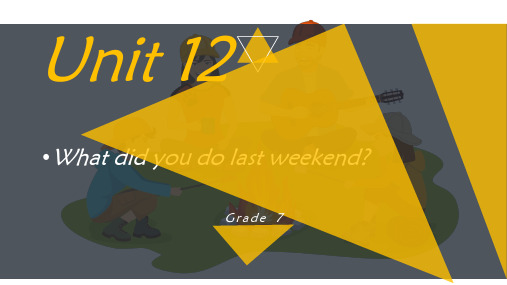
3.当我看到考试分数时,我吃了一惊。
I __g_o_t____a___s_u_r_p_r_is_e_______ when I saw the grades of the exams.
4.你能教我怎样搭这个帐篷吗?
Can you teach me ____h_o_w____to____p_u_t____u_p___ the tent?
C.How nice a
D.What nice a
4.__________money we have! We can’t even afford a piece of bread.
A.What little
B.How little
C.What a little
5.__________good book! It’s so helpful to us.
02
词汇专题
natural, tired, surprising…
2.1 sheep
“绵羊” 可数名词 (单复同形)
I bought a sheep just now. So I have five sheep now.
2.2 natural
natural
adj. 自然的
Our city has a good natural environment.
run away 抛开,逃跑 She gave me a book and ran away quickly.
That’s why… 那是为什么…
That’s why I come here.
a second language 第二语言
English is often used as a second language.
人教版七年级下册英语Unit 12 知识点语法归纳总结
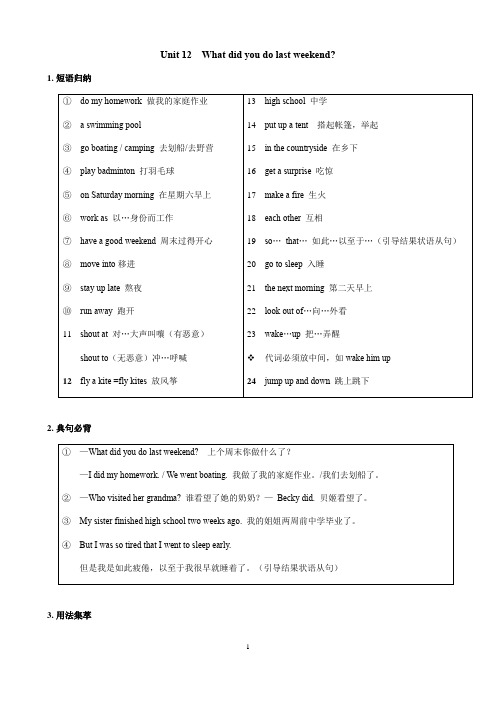
Unit 12 What did you do last weekend?1.短语归纳2.典句必背3.用法集萃(1)What did you do last weekend? 你上周末做了什么?❖last 作形容词时,意为“最后的,最末的”或者“紧接前面的,刚过去的”。
例如:Today is the last day in the year. 今天是今年的最后一天。
I didn’t sleep well last night. 昨晚我没睡好。
❖last作副词时,意为“最后地”,例如:I’m the last one. 我是最后一个。
❖last 做动词时,意思是“持续,继续,维持”等,例如:The hot weather lasted a week. 炎热的天气持续了一周。
(2)How interesting! 多有趣啊!❖本句是how引导的感叹句,how用来修饰形容词或副词,此类感叹句的结构为:“How+形容词/副词( +主语+谓语)!”。
例:How beautiful the girl is! 这个女孩真漂亮啊!How fast the boy is running ! 那个男孩跑得真快啊!❖what也可以引导感叹句,what用来修饰名词。
常见的结构有:(3)I stayed up late to watch the soccer game. 我熬夜到很晚看了足球赛。
❖stay up是固定搭配,意为“熬夜”。
例:She stayed up until 2 :00 am. 她熬夜熬到凌晨两点。
❖常见的“动词+up”结构的短语还有:(4)The cat quickly ran away. 那只猫飞快地逃跑了。
❖run away意为“逃跑;跑开”,其中run意为“跑”,过去式是ran,属于不规则变化。
例:The thief tried to run away, but he failed. 那个小偷试图逃跑,但失败了。
人教版七年级下册unit 12 重点短语归纳背诵
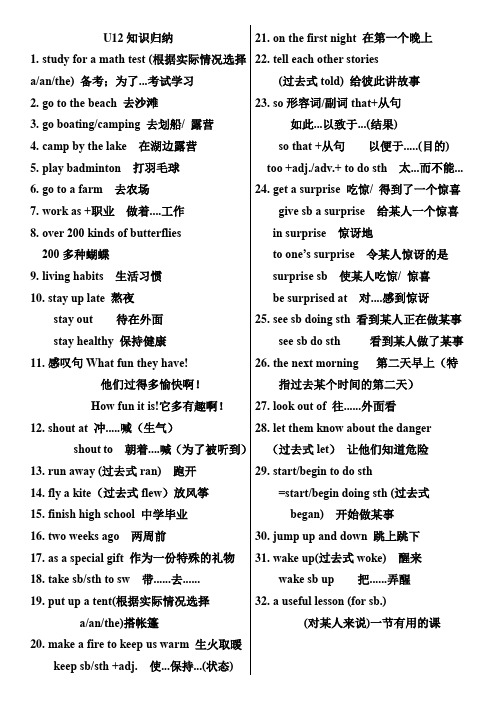
U12知识归纳1.study for a math test (根据实际情况选择a/an/the) 备考;为了...考试学习2.go to the beach 去沙滩3.go boating/camping 去划船/ 露营4.camp by the lake 在湖边露营5.play badminton 打羽毛球6.go to a farm 去农场7.work as +职业做着....工作8.over 200 kinds of butterflies200多种蝴蝶9.living habits 生活习惯10.stay up late 熬夜stay out 待在外面stay healthy 保持健康11.感叹句What fun they have!他们过得多愉快啊!How fun it is!它多有趣啊!12.shout at 冲.....喊(生气)shout to 朝着....喊(为了被听到)13.run away (过去式ran) 跑开14.fly a kite(过去式flew)放风筝15.finish high school 中学毕业16.two weeks ago 两周前17.as a special gift 作为一份特殊的礼物18.take sb/sth to sw 带......去......19.put up a tent(根据实际情况选择a/an/the)搭帐篷20.make a fire to keep us warm 生火取暖keep sb/sth +adj. 使...保持...(状态)21.on the first night 在第一个晚上22.tell each other stories(过去式told) 给彼此讲故事23.so形容词/副词that+从句如此...以致于...(结果)so that +从句以便于.....(目的) too +adj./adv.+ to do sth 太...而不能...24.get a surprise 吃惊/ 得到了一个惊喜give sb a surprise 给某人一个惊喜in surprise 惊讶地to one’s surprise 令某人惊讶的是surprise sb 使某人吃惊/ 惊喜be surprised at 对....感到惊讶25.see sb doing sth 看到某人正在做某事see sb do sth 看到某人做了某事26.the next morning 第二天早上(特指过去某个时间的第二天)27.look out of 往......外面看28.let them know about the danger(过去式let)让他们知道危险29.start/begin to do sth=start/begin doing sth (过去式began) 开始做某事30.jump up and down 跳上跳下31.wake up(过去式woke) 醒来wake sb up 把......弄醒32.a useful lesson (for sb.)(对某人来说)一节有用的课。
- 1、下载文档前请自行甄别文档内容的完整性,平台不提供额外的编辑、内容补充、找答案等附加服务。
- 2、"仅部分预览"的文档,不可在线预览部分如存在完整性等问题,可反馈申请退款(可完整预览的文档不适用该条件!)。
- 3、如文档侵犯您的权益,请联系客服反馈,我们会尽快为您处理(人工客服工作时间:9:00-18:30)。
期末复习参考--人教版七年级下册unit 12重点内容归纳【考点归纳】1、another pron. 又一个;再一个意指三者及以上当中的“另外一个”Mozart was another very important composer.莫扎特是另一位非常重要的作曲家。
This sweater is too big for me. Could you show me another one?这件毛衣对我来说太大了。
你能再给我拿一件吗?May I have another two bananas?我可以再吃两个香蕉吗?【探究总结】another的用法(1)another用作形容词,意为“又一个的;再一个的”,指三者或三者以上中的另一个,其后接可数名词单数。
与其相对应的是“the other”,指两者当中的另外一个例如:I want to have another apple,although I have eaten one.One side of the road is so clean,but the other dirty.(2)another用作代词,意为“又一个;再一个”,一般单独使用。
(3)another作“又;再”讲时,构成短语:another+数词+可数名词复数=数词+ more + 可数名词复数。
2、both pron. 两个;两者Well, I like both. 嗯,两种我都喜欢。
There are many flowers on both sides of the street. 街道的两旁有许多花。
Both his father and his uncle are very tall. 他父亲和他叔叔都很高。
【探究总结】both的用法(1)both 用作代词,意为“两个;两者”;用作形容词,意为“两者都”,其后接可数名词复数形式;both用于be动词或助动词之后,实义动词之前;其反义词为neither。
与其相对应的为“all”,意为三者及以上都(2)both . . . and . . . 意为“既…又… ”,用于连接并列的句子成分。
若both . . . and . . . 连接并列主语,谓语动词须用复数形式。
3、across&throughThe old man walked across the road. 这位老人走过了马路。
It goes through many cities. 它穿过许多城市。
【探究总结】through与across的区别Across指“从表面穿过”Through指“从立体空间内穿过”4、lively adj. 活泼的;轻快的This piece of music sounds very lively. 这首曲子听起来很轻快。
Lucy is a lively girl. 露西是一个活泼的女孩。
Is the snake living?那条蛇还活着吗?【探究总结】lively 的用法(1)lively虽然以-ly结尾, 但其词性为形容词, 在句中可以作定语、表语或宾语补足语。
(2)lively; living; alive的区别。
lively 活泼的;轻快的可以作定语、表语或宾语补足语。
既可指人,又可指物living 活的; 活着的强调说明“尚在人间”“健在”,既可指人,又可指物;可用作定语或表语alive 活着的其反义词为dead;既可指人,也可指物;可用作表语、后置定语或宾语补足语(3)以-ly结尾的形容词还有lovely(可爱的),lonely(孤独的),friendly(友好的),likely(很可能的),daily(每日的),weekly(每星期的),yearly(每年的)等。
5、makeThe boss made the workers do the work all day. 老板迫使工人们整天干活。
We made him our monitor. 我们选他当班长。
探究总结】make的用法(1)make+sb. /sth. +adj. 意为“使某人/某物(怎么样)”。
(2)make+sb. /sth. +n. 意为“使某人/某物成为……”。
(3)make+sb. +do sth. 意为“使某人做某事”。
6、sound n. 声音v. 听起来Hmm, the sound is very different, isn’t it? 嗯,这声音很不一样,不是吗?How sweet the music sounds! 这音乐听起来多悦耳!【探究总结】sound与noise和voice的区别如下:sound 声音泛指自然界的一切声音,不论其高低、是否悦耳等noise 噪音指的是人们不愿听到的声音或嘈杂声voice 声音;嗓音指人说话或歌唱等的嗓音【重点短语】a weekend to remember一个值得记住的周末a second language第二语言camp by the lake在湖边扎营each other互相;彼此fly a kite放风筝finish high school中学毕业go to the cinema去电影院go boating去划船go to the beach去海滩go to sleep去睡觉go camping野营get a surprise吃惊have dinner with friends 和朋友起吃晚饭kind of tired有点累keep warm保暖look out of... .....外面看make a fire生火play badminton打羽毛球put up the tent搭帐篷run away跑开study for..为.....而学习shout at .. 冲着.....大声喊叫see sb. doing sth.看见某人正在做某事soccer game足球赛swim in a swimming pool在游泳池里游泳so... that... 如此.. ... .以.至......stay up late熬夜shout to... 对.....大声喊叫the Natural History Museum自然历史博物馆200 kinds of butterflies两百种蝴蝶up and down上上下下;起伏wake... up把... ... 弄醒【重点句子】As a special gift ,our parents took us to India.作为一份特殊的礼物, 我父母带我们去了印度。
First, we took a long bus ride to a lake in the countryside.首先,我们坐了很久的公共汽车来到乡村的一个湖边。
How was your weekend? 你周末过得怎样?How interesting! 多么有趣啊!I worked as a guide at the Natural History Museum. 我在自然历史博物馆当过导游。
I stayed up late to watch the soccer game. 我熬夜看足球赛了。
I was so scared that I couldn't move. 我太害怕了以至于动不了。
My dad started to jump up and down in their tent.我爸爸开始在他们的帐篷里跳来跳去。
My dad told me later that snakes don't have ears but can feel things moving.后来我爸爸告诉我蛇没有耳朵,但是它们能够感受到物体移动。
They have a butterfly house with over 200 kinds of butterflies!他们有一间蝴蝶室,里面有200 多种蝴蝶!That's why it's important to learn a second language.那就是学好第二语言很重要的原因。
There we put up our tents and made a fire to keep us warm and cook food on.在那儿我们搭起帐篷,生起一堆篝火来取暖并在篝火上面做饭。
This was a very useful lesson for me.对我来说,这是非常有用的一课。
What did you do last weekend? 你上周末做了什么?Who did she go with? 她和谁一起去的?When we looked out of our tent,we saw a big snake sleeping near the fire.当我们向帐篷外面看时,我们看到了一条大蛇正睡在篝火旁边。
We shouted to our parents to let them know about the danger.我们朝父母大喊,让他们知道我们的危险。
【语法归纳】一、感叹句用来表达人的特殊情感的句子,可以表达人的喜、怒、哀、乐等感情色彩。
感叹句可以是一个单词、一个不定式短语、一个由短语构成的独立句也可以是由what\how引导的句子,句末常用“!”。
1.what引导的感叹句(1)What+a\an+形容词+可数名词的单数形式+主语+谓语!What a kind man he is!(2)What+形容词+可数名词的复数形式+主语+谓语!What important jobs they have done!(3)What+形容词+不可数名词+主语+谓语!What fine weather it is!2.how引导的感叹句(1)How+形容词或副词+主语+谓语!How interesting the old woman is!(2)How+形容词+a\an+可数名词单数形式+主语+谓语!How useful a dictionary it is!(3)How+主语+谓语!How time flies!3.一些特殊形式的感叹句(1)在陈述句、祈使句或疑问句句尾加感叹号变为感叹句,表示某种强烈的感情。
He runs so fast!(2)用一个词或词组表达强烈感情的句子也是感叹句Wonderful!(3)以there,here等副词开头的感叹句。
There he is!二、选择疑问句提出两种或两种以上的情况,要求对方选择一种情况回答的问句叫选择疑问句。
选择疑问句中的两种或两种以上的情况用or连接,回答时不能使用yes或no,而要用一个完整的句子或其省略形式。
